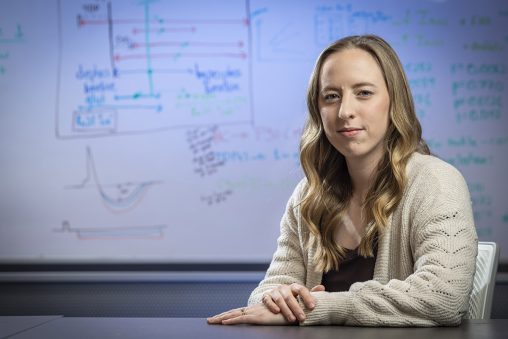
Morgan Highlander, who is pursuing a Ph.D. in engineering at Wright State, received a prestigious two-year National Institutes of Health diversity award to support her research on amyotrophic lateral sclerosis or ALS.
First-generation college success stories come from all sorts of student backgrounds. Few who know her are surprised that Morgan Highlander, who hails from a rural community in Darke County, is one of those stories.
While she originally envisioned basketball as key to her future success, today Highlander seeks to emulate Marie Curie more so than Caitlin Clark, as her academic pursuits have leapfrogged athletics.
Highlander is pursuing a Ph.D. in engineering with a focus in biomedical systems, or neuroengineering, from Wright State University after receiving her bachelor’s degree in electrical engineering and her master’s degree in biomedical engineering from Wright State.
She received a prestigious two-year National Institutes of Health diversity award through the National Institute of Neurological Disorders and Stroke to support her research project studying motoneurons in amyotrophic lateral sclerosis (ALS), or Lou Gehrig’s disease. The award will fund the remainder of Highlander’s predoctoral training and allow her to travel and share her work at national and international conferences.
“My current project is the development of a new automated and unbiased way to analyze potassium channels which we think are playing important roles in ALS,” said Highlander. “We believe this new methodology will improve our understanding of ALS mechanisms that are not fully understood in the field. Hopefully, my research will reveal new targets for future therapies and treatments.”
Growing up on a farm about an hour’s drive from Wright State, Highlander defied some traditional conventions that can define families from small, rural communities.
She set her sights on academics as a vehicle to help her break out of the mold, but her competitive mindset also followed her to the basketball court, where she spent hundreds of hours honing her roundball skills.
“It was never my plan to attend Wright State because my sights were set on pursuing a basketball scholarship where I was being recruited elsewhere,” she said.
So, when she decided not to pursue her basketball career and stay close to her family, she said a “happy accident” brought her to Wright State on a full academic scholarship instead.
“Basketball will always hold a special place in my heart,” she said. “It taught me so much about hard work, dedication, being a team player and being a gracious winner and loser. But my education was the real gateway to my future.”
Highlander said she felt at home for the first time in her life in Wright State’s College of Engineering and Computer Science and over the past decade has met many influential and inspiring people.
“I was and am free to be my authentically nerdy self,” she said.
The field of neuroscience first became a fascination for Highlander after her brother suffered a spinal cord injury while she was in high school. It became her goal to help those living with injury and disease.
Highlander found a unique niche for applying her electrical engineering background in studying motoneurons in the research lab of Sherif Elbasiouny, Ph.D., the Wright State University and Premier Health endowed chair in neurodegenerative diseases research, director of neuroengineering education and research, and professor in the Department of Biomedical, Industrial and Human Factors Engineering.
“I very much believe in Morgan’s abilities,” said Elbasiouny. “Whenever we have a difficult research project in the lab, she is among the first who come to my mind for people who can do work and get the project done. I predict a very bright future for Morgan.”
Originally, Highlander considered pursuing a doctorate because she loves teaching.
“But then I discovered this wildly interesting neuroengineering research,” she said. “I still have a passion to teach, but now I hope to do that beyond the traditional classroom in a mentorship/advisory role by running my own research lab in the future.”
Her hope is to one day develop a device or therapy to help her brother and others like him who live with lingering symptoms from their injuries.
Highlander met her husband, Tyler, at Wright State nearly 10 years ago and together they have a son and a daughter.
She encourages others to “let your passion evolve and don’t be afraid to take a nontraditional or unexpected path.”

 Wright State psychology team studies ways to identify fatigue in pilots, drivers
Wright State psychology team studies ways to identify fatigue in pilots, drivers  Wright State videographer Kris Sproles wins Regional Emmy and Ohio journalism award
Wright State videographer Kris Sproles wins Regional Emmy and Ohio journalism award  Wright State Boonshoft School of Medicine ranked among the nation’s best for 2024 by U.S. News
Wright State Boonshoft School of Medicine ranked among the nation’s best for 2024 by U.S. News  Exposing biotechnology
Exposing biotechnology  Wright State faculty member Dan Noel uses unique background to inspire new leaders
Wright State faculty member Dan Noel uses unique background to inspire new leaders 